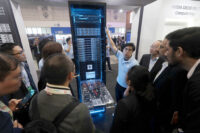Gainesville automation company acquired by Naviant
Naviant announced last week that it has acquired Versivo, a Gainesville-based business process automation provider.
OECD lifts global, US growth outlook for 2025
WASHINGTON (AP) — The world economy has proven surprisingly durable in the face of President Donald Trump’s trade wars, the Organization for Economic Cooperation and Development said Tuesday, upgrading its outlook for global and U.S. economic growth this year. The 38-country OECD now forecasts that the world economy will grow 3.2% this year, down a tick […]
Investment advising in the AI era
When wealth advisers and clients meet these days, it’s likely an AI tool will join in some capacity. As seems true of every industry right now, artificial intelligence is transforming wealth management and, by virtue, the adviser-client relationship. It might be tempting to predict — as some analysts have — that AI could put advisers […]
2025: The year of living disruptively
Looking back on 2025, the best symbol of the past year’s upheaval might be the White House, if not its most famous occupant. Since moving back into 1600 Pennsylvania Ave. in January, our real estate mogul president has launched into a series of home renovations worthy of its own HGTV series. The most prominent changes […]
Layoffs are piling up, raising worker anxiety. Here are some companies that have cut jobs recently
A stalled “no-hire, no-fire” economy and rising costs have driven major companies from HP to Amazon to announce large layoffs, deepening worker anxiety.
Amazon to invest $50B to expand federal AI, computing capacity
Amazon plans to invest up to $50 billion to expand artificial intelligence and supercomputing capacity for its U.S. government cloud customers.
Stocks rally ahead of Thanksgiving on Fed rate-cut hopes, AI surge
U.S. stocks climbed Monday as investors bet on a December Fed rate cut and AI giants boosted the market ahead of the Thanksgiving holiday.
OpenAI and Taiwan’s Foxconn to partner in AI hardware design and manufacturing in the US
OpenAI teams up with Foxconn to design and build AI data center equipment in the U.S., boosting American AI infrastructure and manufacturing capacity.
Nvidia sales soar as AI chip demand beats forecasts
Nvidia’s AI chip sales surged past expectations, easing tech market jitters and lifting the stock more than 5% after its quarterly results.
RVA757 Connects strategy calls for more digital infrastructure along corridor
RVA757 Connects unveiled its 2035 Global Internet Hub Vision Plan to position the I-64 corridor as a hub for digital infrastructure.
Anthropic invests $50B in AI data centers, Microsoft expands
Anthropic plans $50B in AI data centers; Microsoft builds new Atlanta facility as tech giants expand energy-heavy AI infrastructure.
BigBear.ai to acquire Warren County-based AI company for $250M
McLean-based government tech contractor BigBear.ai announced this week that it has entered an agreement to acquire Ask Sage for $250 million.
























